
Melody Ranch is a 1940 Western musical film directed by Joseph Santley and starring Gene Autry, Jimmy Durante, and Ann Miller. Written by Jack Moffitt, F. Hugh Herbert, Bradford Ropes, and Betty Burbridge, the film is about a singing cowboy who returns to his hometown to restore order when his former childhood enemies take over the frontier town. In 2002, the film was added to the National Film Registry by the National Film Preservation Board and selected for preservation as being "culturally, historically, or aesthetically significant."

"Jingle Bells" is one of the best-known and most commonly sung American songs in the world. It was written by James Lord Pierpont (1822–1893) and published under the title "The One Horse Open Sleigh" in September 1857. It has been claimed that it was originally written to be sung by a Sunday school choir for Thanksgiving, or as a drinking song. Although it has no original connection to Christmas, it became associated with winter and Christmas music in the 1860s and 1870s, and it was featured in a variety of parlor song and college anthologies in the 1880s. It was first recorded in 1889 on an Edison cylinder; this recording, believed to be the first Christmas record, is lost, but an 1898 recording also from Edison Records survives.

"Old Folks at Home" is a minstrel song written by Stephen Foster in 1851. Since 1935, it has been the official state song of Florida, although in 2008 the original lyrics were revised. It is Roud Folk Song Index no. 13880.
"Oh My Darling, Clementine" is a traditional American western folk ballad in trochaic meter usually credited to Percy Montross (1884), although it is sometimes credited to Barker Bradford.
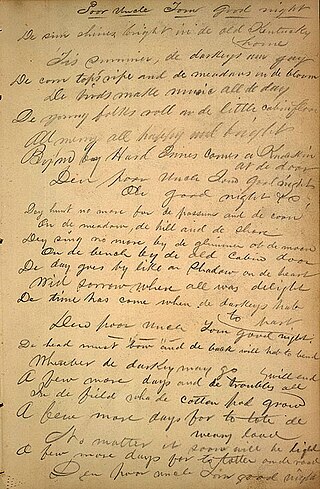
"My Old Kentucky Home, Good-Night!" is a sentimental ballad written by Stephen Foster, probably composed in 1852. It was published in January 1853 by Firth, Pond, & Co. of New York. Foster was likely inspired by Harriet Beecher Stowe's anti-slavery novel Uncle Tom's Cabin, as evidenced by the title of a sketch in Foster’s sketchbook, “Poor Uncle Tom, Good-Night!”

"Carolina in the Morning" is a popular song with words by Gus Kahn and music by Walter Donaldson, first published in 1922 by Jerome H. Remick & Co.

"The Yellow Rose of Texas" is a traditional American folk song dating back to at least the 1850s. Members of the Western Writers of America chose it as one of the Top 100 Western songs of all time. Several versions of the song have been recorded, including by Elvis Presley, Willie Nelson and Mitch Miller.
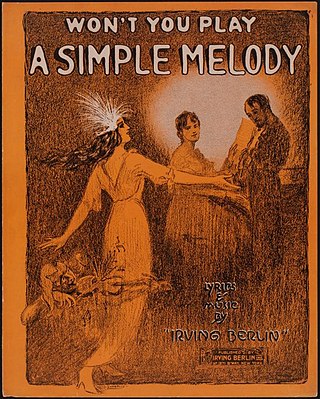
"Play a Simple Melody" is a song from the 1914 musical, Watch Your Step, with words and music by Irving Berlin. The show was the first stage musical that Berlin wrote. It ran for 175 performances at the New Amsterdam Theater in New York City. The one song from the show that is well-remembered today is "Play a Simple Melody," one of the few true examples of counterpoint in American popular music — a melody running against a second melody, each with independent lyrics. Two other of Berlin's so-called "double" songs are "You're Just in Love," and "An Old-Fashioned Wedding". In the printed music, first the "simple melody" plays alone. Then comes the contrasting melody. Finally, the two play together. The lyrics of "Play a Simple Melody" also track the counterpoint duet in that one singer yearns for the music which mother sang, but the other singer disdains such classic fare as lacking interest and rhythm. When "Play a Simple Melody" was published, ragtime was in its heyday, led by its most consummate composer, Scott Joplin. In a famous 1916 recording of the song, while Elsie Baker wants what she considers simplicity, Billy Murray explicitly asks for "rag". The song was also recorded by Walter Van Brunt and Mary Carson in 1915.

Hart Pease Danks was an American musician who specialized in composing, singing and leading choral groups. He is best known for his 1873 composition, Silver Threads Among the Gold.
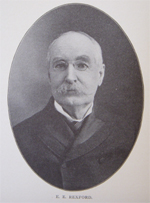
Eben Eugene Rexford was an American writer and poet, and author of lyrics to popular and gospel songs.
"Arrivederci Roma" is the title and refrain of a popular Italian song, composed in 1955 by Renato Rascel, with lyrics by Pietro Garinei and Sandro Giovannini. It was published in 1957 as part of the soundtrack of the Italo-American musical film with the same title, released as Seven Hills of Rome in English. In the movie, the song is sung by the leading character, played by the American singer and actor Mario Lanza. Carl Sigman wrote the lyrics for the English-language version of the movie.

"Darling Nelly Gray" is a 19th century anti-slavery ballad written and composed by Benjamin Hanby in 1856. It is written as from the point of view of an African-American male slave in Kentucky whose sweetheart has been taken away by slave-owners. The man mourns his beloved, who has been sold South to Georgia. He eventually dies and joins her in heaven. The song became very popular in the years preceding the Civil War and helped promote support for the abolitionist cause.

"The Gold Diggers' Song " is a song from the 1933 Warner Bros. film Gold Diggers of 1933, sung in the opening sequence by Ginger Rogers and chorus. The entire song is never performed in the 1933 movie, though it introduces the film in the opening scene. Later in the movie, the tune is heard off stage in rehearsal as the director continues a discussion on camera about other matters.
"How Long Has This Been Going On?" is a song composed by George Gershwin, with lyrics by Ira Gershwin, for the musical Funny Face in 1927.

Robert Craig Campbell (1878–1965) was a Canadian tenor who performed in operettas across Canada and the United States. Campbell recorded with the Columbia, Davega, Perfect and Pathé labels. Although a tenor, Campbell had a very rich voice and could also sing baritone, and described himself as a tenore robusto.
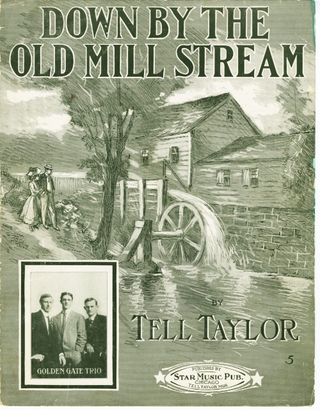
"Down by the Old Mill Stream" is a song written by Tell Taylor. It was one of the most popular songs of the early 20th century. The publisher, Forster Music Publisher, Inc., sold 4 million copies.
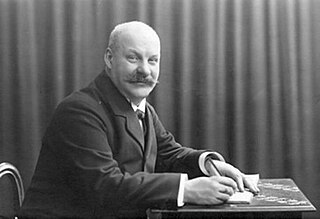
Emil Norlander (1865-1935) was a Swedish journalist, author, songwriter and producer of musical revues.

Carsten Thorvald Woll (1885-1962) was a leading Norwegian-American singer and recording artist of the 1910s and 1920s.

Ali Baba and the Forty Thieves is an LP album by Bing Crosby made for children by Golden Records in 1957. The Arthur Norman Choir and Orchestra provide support. The music was by Mary Rodgers and the lyrics by Sammy Cahn. The album has been reissued by various record companies sometimes in a different edited form. The song "I Love You Whoever You Are" was issued as a single by Kapp Records (KAPP195) in October 1957.

Hannes Saari was a Finnish American singer, songwriter and choir director.



















